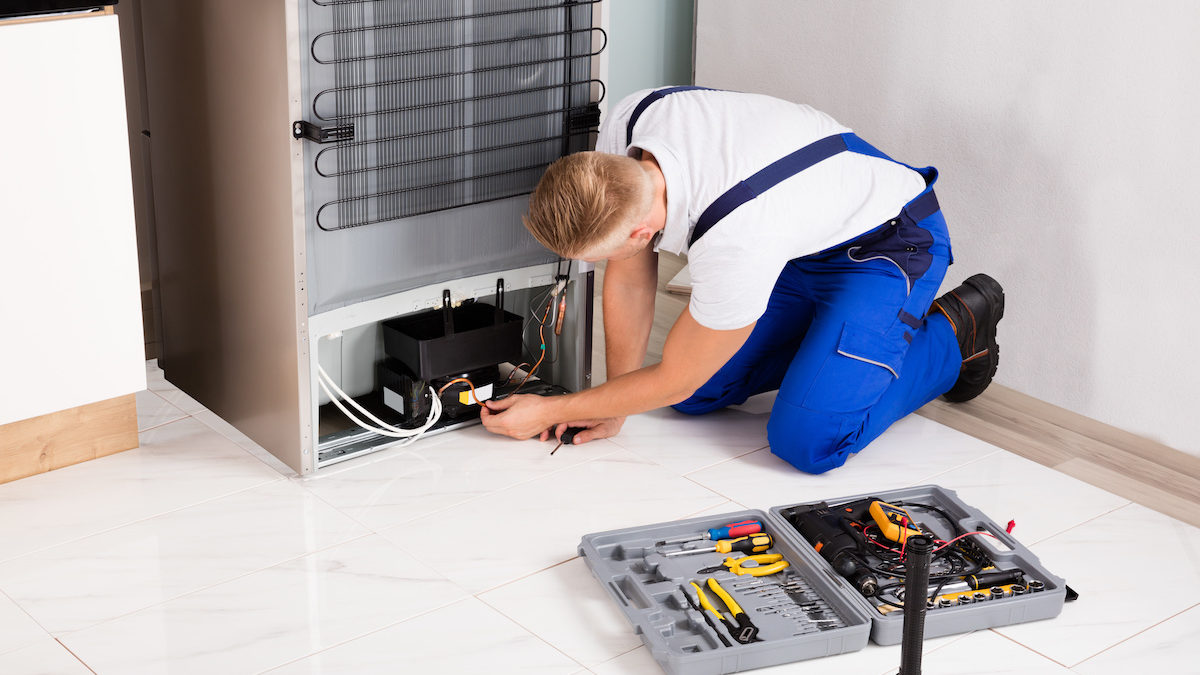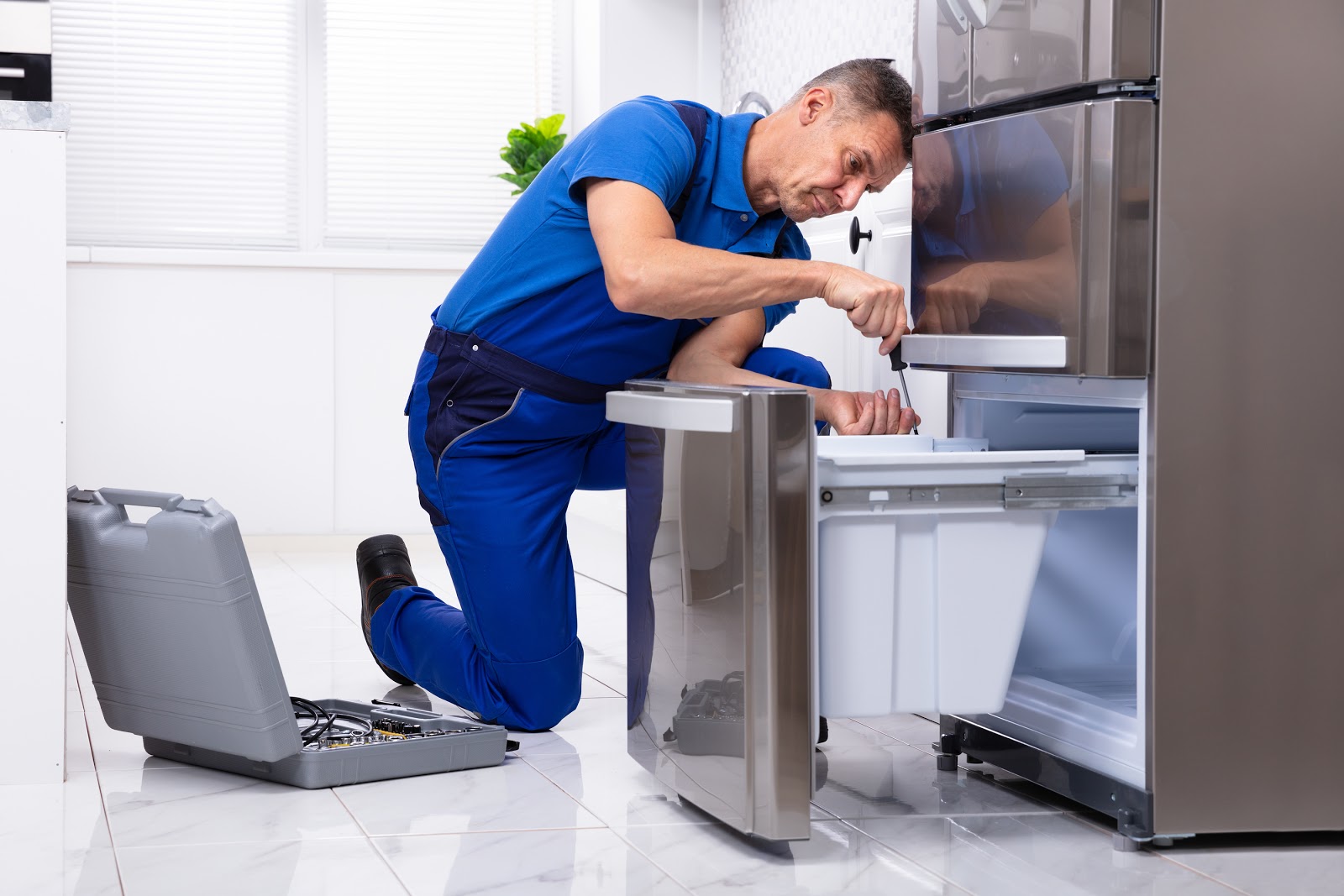Dryer Acting Up? Who Repairs Dryers in Oro Valley? Dependable Refrigeration & Appliance Repair Service Breaks Down DIY vs. Professional Fixes
Dryer Acting Up? Who Repairs Dryers in Oro Valley? Dependable Refrigeration & Appliance Repair Service Breaks Down DIY vs. Professional Fixes
Blog Article
Crucial Tips for Effective Ref Fixing to Extend Device Life-span
When it comes to your fridge, correct repair and maintenance are essential for durability. Recognizing common problems and understanding when to act can make all the difference.
Comprehending Typical Fridge Troubles
Refrigerators are vital in maintaining your food fresh, however they can encounter a range of typical issues that interrupt their efficiency. One constant problem is poor air conditioning. If you see food ruining quicker than usual, inspect the thermostat setups or consider if the door seals are damaged. Another common issue is too much sound, which can suggest a malfunctioning compressor or a stopping working fan. You might additionally experience water merging inside or below the fridge; this frequently results from a stopped up defrost drain or a faulty water line. Furthermore, if your fridge's light isn't working, maybe a straightforward light bulb issue or a trouble with the door button. Ice build-up in the freezer can prevent airflow and cooling down effectiveness. Acknowledging these issues early can save you time and cash in repairs, guaranteeing your refrigerator runs smoothly and efficiently.
Normal Upkeep Practices
To keep your devices running smoothly, you require to remain on top of regular upkeep methods. Clean the condenser coils, inspect the door seals, and keep track of the temperature setups to guarantee peak efficiency. These easy jobs can save you money and time on repair services down the line.
Clean Condenser Coils Frequently
Cleaning your condenser coils on a regular basis can considerably improve your home appliance's performance. Dust and dust develop on these coils with time, causing your home appliance to function more difficult and eat more power. To maintain them clean, unplug your home appliance and carefully eliminate any kind of safety covers. Make use of a vacuum with a brush add-on or a soft brush to gently remove debris. If needed, a blend of cozy water and mild detergent can assist eliminate persistent crud. Make sure to allow whatever completely dry totally prior to rebuilding and connecting the appliance back in. Goal to cleanse your coils at the very least twice a year, or more frequently if you have animals or stay in a messy setting. This straightforward job can extend the lifespan of your home appliance significantly.
Check Door Seals
3 straightforward steps can aid you guarantee your device's door seals are in good problem. First, check the seals frequently for any splits, tears, or indications of wear. These problems can lead to air leakages, affecting effectiveness. 2nd, clean the seals utilizing warm, soapy water to eliminate any kind of debris or grime. A tidy seal assures a limited fit and better performance. Perform a basic examination by shutting the door on an item of paper. If you can easily draw it out without resistance, the seal could need replacing. By complying with these actions, you'll keep your home appliance's performance and longevity, saving you cash on energy costs and repairs in the future.
Display Temperature Level Setups
Consistently checking your appliance's temperature settings is vital for finest performance and effectiveness. Whether you're dealing with a fridge, fridge freezer, or stove, watching on these setups can avoid numerous issues. For refrigerators, go for temperatures between 35 ° F and 38 ° F; for freezers, stick around 0 ° F. If the temperature levels are too expensive or reduced, your appliance might function harder, losing power and reducing its life expectancy. Use a thermostat to inspect these settings frequently, especially after major adjustments, like moving your appliance or readjusting the thermostat. If you see variations, readjust the setups accordingly and seek advice from the individual manual for assistance. By staying proactive concerning temperature monitoring, you'll assure your home appliances run smoothly and last much longer.
Repairing Cooling Problems
When your refrigerator isn't cooling down correctly, it can bring about spoiled food and squandered cash, so attending to the concern quickly is crucial. Begin by inspecting the temperature level setups to validate they're at the recommended degrees, typically around 37 ° F for the fridge and 0 ° F for the freezer. If the setups are appropriate, check the door seals for any type of gaps or damages; a damaged seal can permit cozy air to get in.
Following, check out the vents inside the fridge and freezer. Verify they're not blocked by food items, as this can interfere with air flow. Pay attention for the compressor; if it's not running or making uncommon noises, it may need interest. Examine the condenser coils, usually situated at the back or base of the device. Dirt and particles can build up, triggering cooling issues. Tidy them with a vacuum or brush to maximize performance. If issues linger, it could be time to call an expert.
Repairing Water Leak and Ice Build-Up
If you're handling water leak or ice build-up in your home appliance, it's important to identify the source of the trouble. By pinpointing where the water is coming from, you can prevent more concerns and stay clear of costly fixings. Allow's check out some effective approaches to tackle these usual issues.
Recognize Leakage Sources
Exactly how can you effectively recognize the resources of water leakage and ice accumulation in your devices? Begin by examining the seals and gaskets on your refrigerator and fridge freezer doors. A worn or damaged seal can permit warm air to enter, creating condensation and ice. Next, examine the drainpipe pan and drain system for clogs or clogs; a backed-up drainpipe can bring about water merging. Seek any kind of loose links in the water line, which can produce leaks. Additionally, take a look at the defrost drain for ice build-up, which can interfere with proper water drainage. By methodically inspecting these areas, you'll determine the source of the issue, permitting you to take the essential steps to repair it and extend your home appliance's life-span.
Stop Ice Development
To avoid ice development in your home appliances, start by confirming the temperature setups are ideal. If your fridge or fridge freezer is also cold, it can result in extreme ice build-up. Examine the door seals consistently; damaged seals can let warm air in, creating condensation and ice development.
Maintain the device well-ventilated and stay clear of congestion, as this can obstruct air flow - Dependable Refrigeration & Appliance Repair Service LG Appliance read this post here Repair. Routinely defrost your freezer if it doesn't have an automatic defrost feature.
If you see water leak, determine and fix any obstructed water drainage holes, as they can contribute to ice accumulation. Lastly, tidy the coils and validate they're working appropriately to maintain peak performance. Taking these steps will certainly assist extend your device's lifespan and efficiency.
Addressing Noisy Fridge Sounds
While it could appear alarming, a loud refrigerator commonly indicates minor problems rather than major breakdowns. Identify the source of the sound. Typical culprits include the compressor, followers, and water lines. If you hear a buzzing audio, it could be the compressor working hard; this could simply be a normal procedure audio.
Following, look for loose things inside. Sometimes, containers or racks can rattle, developing unwanted noise. Tighten up or reorganize them to eliminate the noises.
If you observe a clicking sound, it may be the defrost timer. This is typically harmless however might suggest it requires inspection.
Lastly, verify your fridge is level. An out of balance home appliance can create resonances and noise. Utilize a degree to examine, and readjust the feet if required. Addressing these problems without delay can help maintain your refrigerator's performance and lengthen its life-span.
When to Change Components vs. Full Replacement

However, if your home appliance is older and experiencing multiple problems, a full replacement can be a lot more affordable. Consider the expense of repairs versus the device's value. If fixings surpass 50% of a brand-new system's rate, it's usually smarter to purchase a replacement. In addition, if you notice continuous problems that maintain persisting, it's a sign that your home appliance has gotten to the end of its life. Weigh these aspects carefully to make the very best decision for your demands and budget.
Understanding When to Call a Specialist
Exactly how can you inform when it's time to call in a professional for appliance repair service? If your device quits functioning altogether or frequently trips circuit breakers, it's another red flag.
You should also consider your own convenience degree with repairs. If you're unsure about identifying the issue or lack the right tools, it's best to reach out for aid. Bear in mind, trying difficult repairs can bring about even more damage or even safety and security threats.

Regularly Asked Concerns
Just how Usually Should I Tidy the Refrigerator Coils?
You need to clean your fridge coils every six months. This aids preserve effectiveness and avoids overheating. If you see extreme dust or animal hair, tidy them extra often to assure your fridge runs smoothly.

Can I Make Use Of Vinegar for Cleaning My Fridge?
Yes, you can utilize vinegar to clean your refrigerator! It's an exceptional all-natural cleaner that removes smells and stains. Washing Machine Repair Dependable Refrigeration & Appliance Repair Service. Just blend it with water, apply it to surface areas, and clean down for a fresh, tidy refrigerator
What Temperature Should My Refrigerator Be Set To?
You need to set your refrigerator to 37 ° F(3 ° C) for this link excellent food preservation. This temperature keeps your food fresh while protecting against putridity, ensuring your groceries last much longer and reducing waste. It's an easy modification you go to my blog can make!
Does a Fridge Required to Be Leveled?
Yes, your fridge requires to be leveled. If it's unequal, it can impact cooling down efficiency and cause excess sound. Examine the leveling legs and adjust them to assure proper balance for optimal performance.
How Can I Decrease Refrigerator Power Usage?
To decrease your refrigerator's energy consumption, maintain it tidy and well-ventilated, examine door seals for leakages, set the temperature between 35-38 ° F, and stay clear of overloading it. These actions can significantly reduce your energy bills.
Report this page